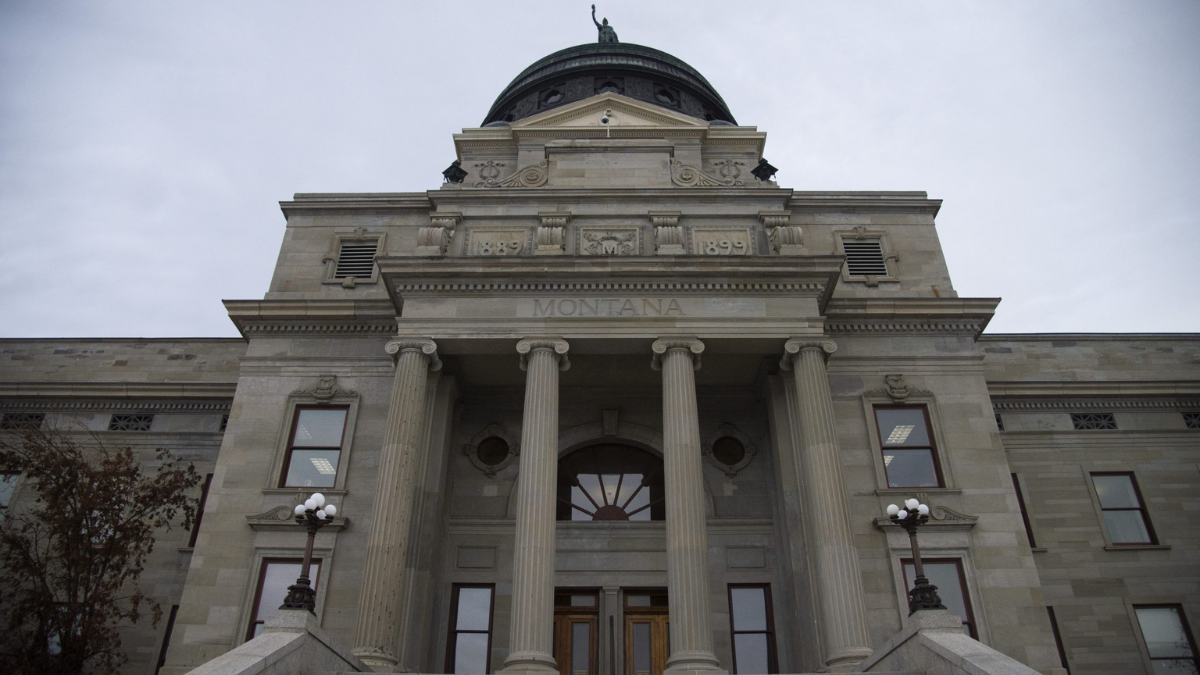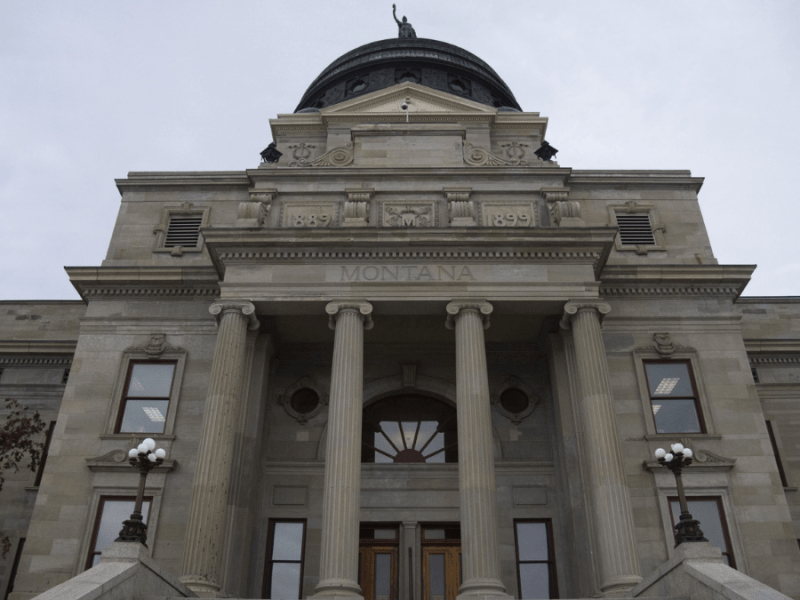Three new voices formally joined the ongoing legal battle this week over one of the 2023 Montana Legislature’s charter school laws, adding another layer of complexity to the case and shedding light on the types of schools individuals are intent on establishing.
In separate declarations to the Lewis and Clark County District Court Sept. 15, Kasey Koehler of Miles City and Connie Filesteel of the Fort Belknap Indian Reservation laid out their plans to create specially tailored schools in their respective communities under the auspices of House Bill 562. Judge Chris Abbott granted their requests Monday to intervene in the case, along with a similar request by Rep. Jonathan Windy Boy, D-Box Elder, who was the lone Democrat to vote in favor of the bill. All three are represented by Dale Schowengerdt, a former solicitor general under Republican Attorney General Tim Fox and now an attorney with the Great Falls-based firm Landmark Law.
As signed by Gov. Greg Gianforte in May, HB 562 allows community members to establish what the law refers to as a “community choice” school, provided they receive approval from either an authorized local school board or an autonomous state commission. Supporters of the law were initially optimistic that the first wave of choice school proposals would be reviewed and approved ahead of the 2024-2025 school year. However, Abbott partially blocked the implementation of HB 562 earlier this month, allowing the newly formed commission to adopt bylaws but barring its consideration or approval of any charter applications while the litigation proceeds.
Speaking with Montana Free Press this week, Filesteel said that injunction “leaves us in limbo” in regards to her own efforts on the Fort Belknap. Filesteel is the former principal of the Hays-Lodge Pole Schools on the southern end of the reservation and a former professor at Aaniiih Nakoda College. She’s also a longtime advocate of incorporating tribal culture and language into the daily lives of Fort Belknap’s K-12 students. But ongoing initiatives at public schools in Hays-Lodge Pole and Harlem have resulted in limited exposure to traditional knowledge — 30 to 60 minutes a day at best, she said, not nearly enough to produce fluent Aaniiih and Nakoda speakers or reverse decades of intergenerational trauma.
RELATED
Judge blocks portion of law allowing charter schools in Montana
A state judge in Helena Wednesday blocked portions of a law passed by the 2023 Legislature to create a system of charter schools — or what supporters call “community choice schools” — in Montana.
“We need to really provide a quality education in terms of dismantling a lot of the thinking that is not in alignment with who we are as Aaniiih and Nakoda people,” Filesteel said. “I see that play out today within our tribal nations, within our local tribal councils, a lot of the dysfunction. So we really need to take control of our own education.”
To that end, Filesteel has founded a nonprofit Aaniiih Nakoda Montessori Academy, which she envisions as a dual language immersion school focused on the English, Aaniiih and Nakoda languages. Citing consistently low standardized test scores in local schools and statewide, she said her goal is not only to promote strong tribal identity but to provide a learning environment that will improve student success in non-cultural subjects like math. Filesteel plans to start small with a focus on kindergarten through sixth grade and said she’s working with private donors to secure land on Fort Belknap for a school site.
Regardless of HB 562’s fate, Filesteel remains committed to making the academy a reality. The school will likely start off as a private offering, she said — similar to existing outfits such as the Nkwusm Salish Language School in Arlee. However, Filesteel added, the ability to apply later for community choice school status and qualify for per-pupil funding from the state as a result would bolster the academy’s sustainability and inject the resources needed to accommodate future growth.
“As it stands right now, we’ll serve as many students as possible,” Filesteel said, noting that she’s hopeful the academy will break ground within the next two years. “But with this community choice [option], I believe that we can expand, we can open up and serve even a greater amount of students.”
Windy Boy offered a similar assessment in his request to intervene, elaborating on an argument he made supporting HB 562 on the House floor this spring. In his filing to the court, he said that Montanans aren’t “doing enough to improve the [public school] system so no students are left behind.” The problem is particularly pronounced in reservation and bordertown communities, Windy Boy said, noting that Rocky Boy High School — four miles from his Box Elder home — is among the state’s worst performing schools in core subjects like English and math.
RELATED
School choice gaining legislative traction after years of debate
Lawmakers have already advanced a pair of charter school proposals further than any point in the past decade. How are parents and teachers outside the Capitol responding to the Legislature’s embrace of school choice?
“The Community Choice Schools Act is designed to allow community choice charter schools to be formed that focus on specific needs of students to ensure that students, like those in Box Elder, are not left behind,” Windy Boy wrote, adding that he is currently working with local educators and administrators on the Rocky Boy’s Indian Reservation to establish a dual language immersion school focused on English, Chippewa and Cree.
That view of choice schools as a pathway toward more tailored educational opportunities echoes the position Koehler took in her declaration to the court last week. Koehler, a former public school principal in Miles City and the recipient of a 2018 award from the National Association of Special Education Teachers, was not immediately available for an interview. But her statements to the court outlined a proposed choice school in Miles City aimed at educating students based not on age but rather on their individual needs and mastery of instructional material.
“The bottom line is that kids do best in an environment where they are challenged,” Koehler wrote. “But if a student has academic gaps, it does them no good to pass them through subjects that they do not understand. That impedes their ability to learn the material at more advanced levels, if at all.”
Like Filesteel, Koehler attributed her interest in choice schools largely to the broad academic and governance flexibilities offered under HB 562. The law achieved those flexibilities in part by exempting its schools from compliance with a large swath of existing state law governing public schools — one of the primary points opponents have leveraged in arguing that choice schools are not public entities.
“The bottom line is that kids do best in an environment where they are challenged. But if a student has academic gaps, it does them no good to pass them through subjects that they do not understand.”
Kasey Koehler, former Miles City principal
That particular detail is among the many disagreements the courts are now tasked with resolving. The lawsuit over HB 562 was originally filed in June by a collection of plaintiffs, including the Montana Quality Education Association, that argue that HB 562 exempts choice schools from needed legal and regulatory safeguards and directs state education funds to schools they consider to be private, in violation of the Montana Constitution. The plaintiffs also continue to assert that several other pathways already exist in state law for establishing public charter schools, among them House Bill 549, which the Legislature approved alongside HB 562 and has not been challenged in court.
“Public school plaintiffs do not object to public charter schools generally, only to privatized schools that exist outside of all traditional accountability mechanisms,” Rylee Sommers-Flanagan, executive director of Helena-based Upper Seven Law and an attorney for the plaintiffs, told MTFP this week. “[The] intervenors have long been able to create new charter schools under existing state law — and under the recently passed HB 549 — and neither of those options violate the Montana Constitution.”
Asked, as one of the state defendants, for a response to the intervenors’ addition to the case this week, Gianforte’s office said it does not typically comment on active litigation but added that “the governor remains committed to empowering Montana parents to choose the education that best meets the individual needs of their child, including the option of public charter schools.”
latest stories
The race to be the partisan clerk of Montana’s nonpartisan Supreme Court
The clerk of the Montana Supreme Court is a unique position. Unlike the actual justiceships on the high court, the clerkship is partisan. And unlike almost every other state supreme court clerk in the country, Montana’s is elected.
Second Montana ski resort looks to turn wastewater into powder
More than a dozen ski areas in eight states, plus some in Canada, Switzerland and Australia, use wastewater to make powder. This past winter, the Yellowstone Club near Big Sky became the first in Montana to turn what was once sewage into snow.
Republican lawmakers mount three separate pushes for special sessions
A trio of special session requests from Republican lawmakers each touch on election-year issues, but lawmakers have historically had little success calling themselves into a special session.



